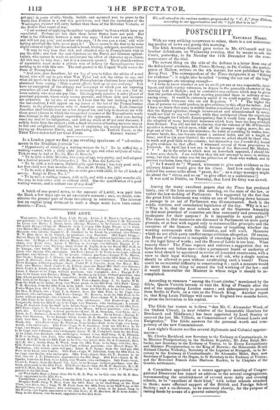Among the many excellent papers that the Times has produced
lately, one of the best occurs this morning, on the state of the law, or rather the law-making of Parliament. It is suggested by the fact that the great Irish indictment was within an ace of breaking down because a passage in an act of Parliament was ill-constructed. Such is the crude, careless, and untechnical legislation of the day. 'WI'S, is it so? "Why is it, that the most solemn acts of the Supreme Assembly in this most practical of countries are thus constantly and proverbially inadequate for their purpose ? Is it impossible to speak plain ?" The reason is, that measures are discussed in Parliament on mere party grounds, or at best with regard only to statesmanlike principles and the intentions of the framers : nobody dreams of inquiring whether the wording corresponds with the intention, and will work. Measures which do not elicit party conflict escape criticism altogether. Of course, the House of Commons is incapable of attending to subtile discussions on the legal force of words ; and the House of Lords is too lazy. What remedy then ? The Times repeats and enforces a suggestion that we have thrown out before now—that a permanent board or authority of some kind should be appointed to revise all intended enactments, with a view to their legal working. And we will ask, why a single session should be allowed to pass without establishing such a board? There could be no material difficulty in constructing it ; such a measure would do more than any thing to amend the bad working of the law ; and it would immortalize the Minister in whose reign it should be ac- complished.


























 Previous page
Previous page